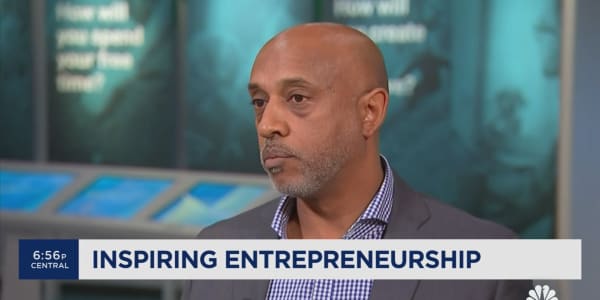
A strategy that aims to generate steady income in retirement is looking less certain as General Electric announced it would cut its quarterly dividend in 2019.
The company announced it would trim the dividend to a penny per share starting next year, marking the second cut to its dividends in a year.
Dividends traditionally are a way for firms to return profits to shareholders.
News on GE's dividend cut arrived on the heels of the company announcing its third-quarter results, wherein it reported adjusted earnings per share of 14 cents. GE shares swooned on Tuesday morning, falling by more than 8 percent.
For a certain group of investors — particularly retirees — a blue-chip company's tumbling share price tells only part of the story: A sharp cut to dividends could mean that their own cash flow could fall short.
"With dividends, your retirement income is susceptible to the whims of the board of directors or the profitability of the company," said Benjamin Brandt, a certified financial planner and founder of Capital City Wealth Management.
"Dividends can be cut," he said.
Here's what you need to know about using dividends in your retirement income strategy.
Steady payments, low taxes
Under ideal conditions, dividend-yielding stocks reward long-term investors, kicking out a payment to them every quarter or every year.
Shareholders receive income without having to sell off their assets, which can reassure retirees who are anxious about eating through their savings.
"It makes sense that you can get $4,000 a month and spend it without having to invade your principal," said Brandt.
Dividend-paying companies also tend to be household names, often major players in the utilities, financial and consumer staples sectors. Consolidated Edison, JPMorgan Chase and McDonald's are just a few.
The Consumer Staples Select Sector SPDR fund, below, holds many large dividend-paying companies, including Procter & Gamble and Coca-Cola.
There's also a tax benefit to dividend-paying stocks: Qualified dividends are taxed at a top rate of 20 percent, while ordinary income tax rates can run as high as 37 percent.
If you manage your income in retirement, remaining in the lowest federal income tax brackets, you could receive your qualified dividends and long-term capital gains at a rate of zero, said Brett Danko, CFP and managing member of Main Street Financial Solutions.
The prospect of receiving regular income from large, stable companies is an attractive one for many retirees, yet financial advisors warn that these investors are overlooking some sizeable risks.
Mind your exposure
Just as companies can reward their investors by sharing a piece of the profit, they can also sharply reduce or eliminate the dividend altogether as they try to retain cash amid distress.
In 2009, as the stock market reached its nadir during the Great Recession, large banks such as Bank of America, Wells Fargo and U.S. Bancorp slashed their dividend payouts.
The development put dividend-hungry investors in a bind.
"During the crisis, a former client had almost solely Bank of America stock," said H. Jude Boudreaux, a CFP and partner at The Planning Center. "They went from having huge income and value to almost nothing."
A painful lesson was in store for that investor: Diversify your investment holdings and your sources of income, or else.
Multiple sources
There's no silver bullet for generating retirement income; however, financial advisors suggest that dividend-focused investors should consider diversifying their holdings and income streams.
"Rather than thinking 'I can only spend dividends that come to me from high-dividend yielders,' say 'I need $100,000 a year, and I don't care whether it comes from dividends, interest payments or capital appreciation,'" said Blair H. duQuesnay, a CFP at Ritholtz Wealth Management.
That's a step that might require retirees to become comfortable with the idea of selling some of their holdings, either to rebalance and dilute their concentration in dividend-yielding stock or to generate cash flow.
Brandt, for instance, requires retired clients to maintain a pot of cash for near-term needs and to ride out market downturns. They remain broadly invested in the market so as to maintain growth through stocks and keep up with inflation.
"As the cash is depleted, if the stocks are up, you rebalance there," he said.
If you're considering investing in dividend-yielding companies, financial advisors recommend thinking about the following points:
Know your risk appetite: Don't let dividends distract you from the fact that you are still holding stocks and are subject to market risk. "How much market volatility are you comfortable with?" asked Boudreaux. "Can you lose 10 percent to 15 percent of the value in two weeks and still feel good?"
Diversify your strategy: Beware of concentration risk, both in terms of your investments and your income sources. "Some clients have pensions, some have rental income, and there's Social Security," said duQuesnay. "The portfolio makes up for the gap."
Understand your flexibility: If you do hold these stocks, make sure that you have sufficient cash flow to weather companies' cuts to dividends.
"The more flexibility you have, the more resilient you will be," said Boudreaux.
More from Personal Finance
In debt trying to keep up with the Kardashians
This repayment hack could help you knock out credit-card debt faster
Time is running out to use these 2018 tax-savings tips






